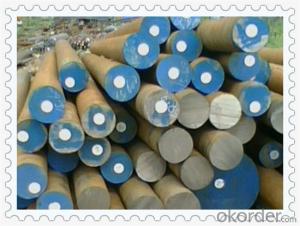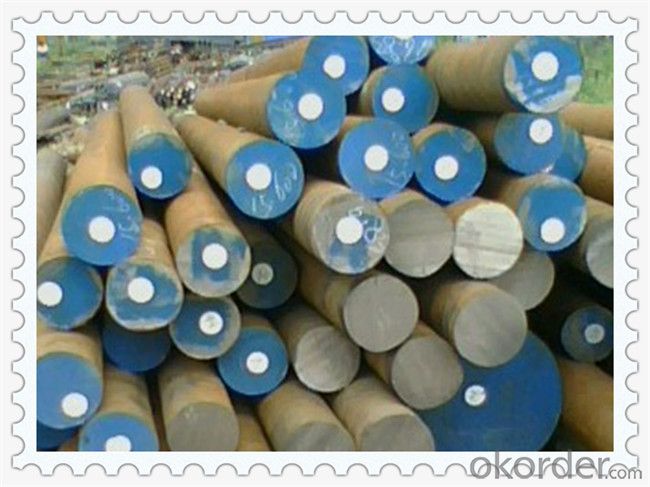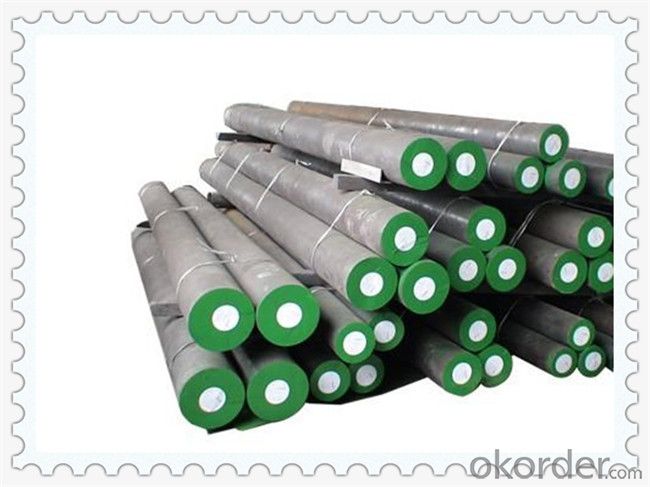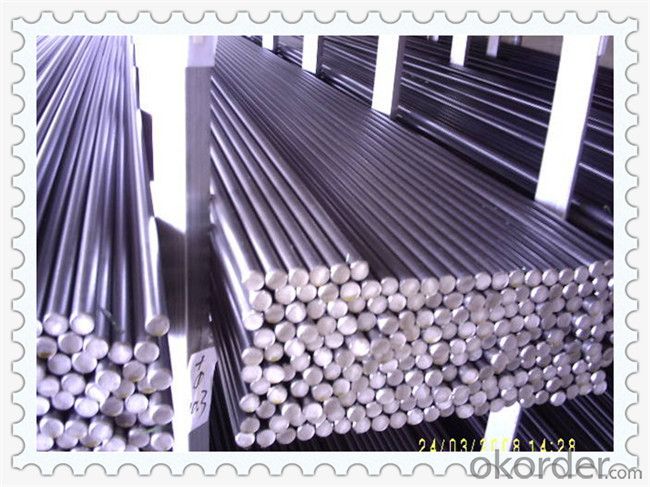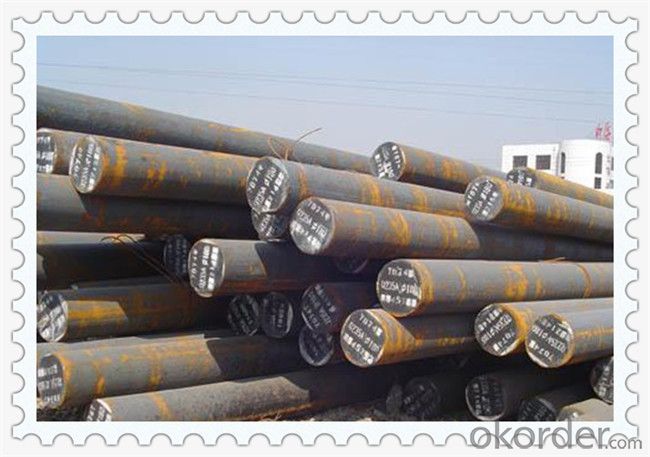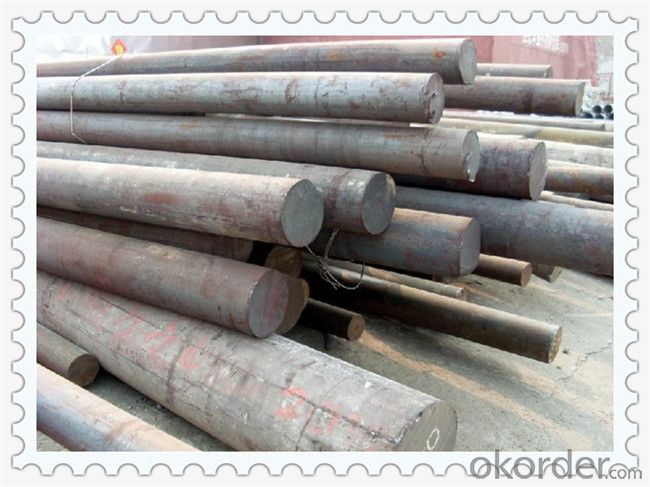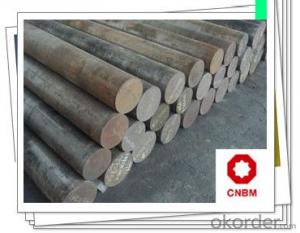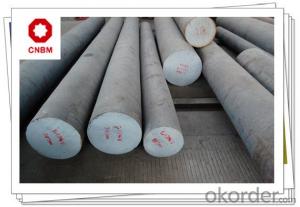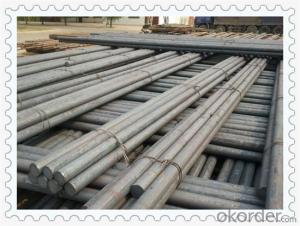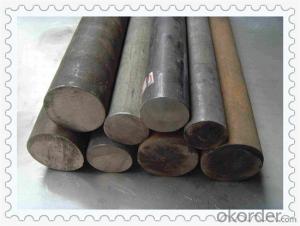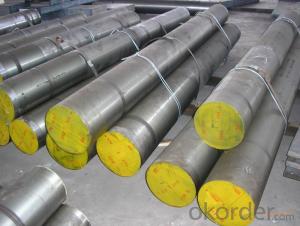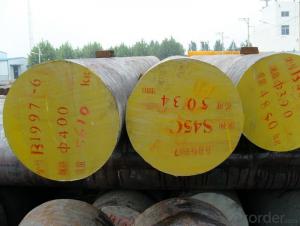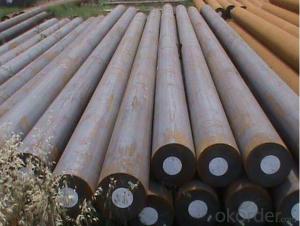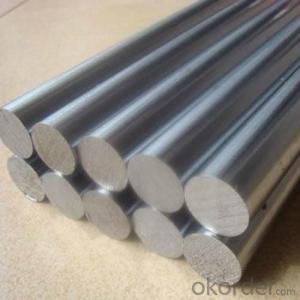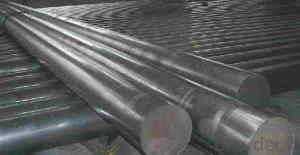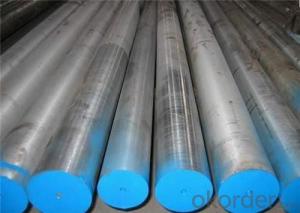SAE 52100 Bearing Steel Round Bars SUJ2
- Loading Port:
- China main port
- Payment Terms:
- TT OR LC
- Min Order Qty:
- 30 m.t.
- Supply Capability:
- 10000 m.t./month
OKorder Service Pledge
OKorder Financial Service
You Might Also Like
SAE 52100 Bearing Steel Round Bars SUJ2
Products Details
ISO9001 certified
Flexible MOQ
Prompt delivery stock within 7days
MTC DIN10204 3.1/3.2
Equivalent Grades
| DIN | AISI | JIS |
| 1.2067 | L1/L3 | SUJ2 |
Composition
| C | Si | Mn | Cr | P | S | Mo | Ni |
| 0.95-1.10 | 0.15-0.35 | 0.25-0.40 | 1.40-1.70 | ≤0.03 | ≤0.03 | --- | --- |
Available Size
| Round steel bar 60-800mm | |||||||||
| Flat steel bar 25-400mm*200-800mm |
Surface Condition
| Black surface/ Grinded/ Machined |
Hardness
| HB225MAX |
Characteristics
Flat Steel GCr15 Flats are of Good hardening ability. Good wear resistance. Shadow depth of hardness |
Applications
Flat Steel GCr15 Flats are for making gauges and measuring tools, mandrels, cold rolls and flanging rolls, wood and paper processing tools, slitting blades, ball bearings and shear knives |
Heat Treatment
| Hardening Harden from a temperature of 790-820oC, 820-860oC followed by water or oil quenching. Hardness after quenching is 63-67, 63-66 HRC. Tempering Tempering temperature: 150-300oC. Hardness after tempering is 56-65 HRC. |
Products Show
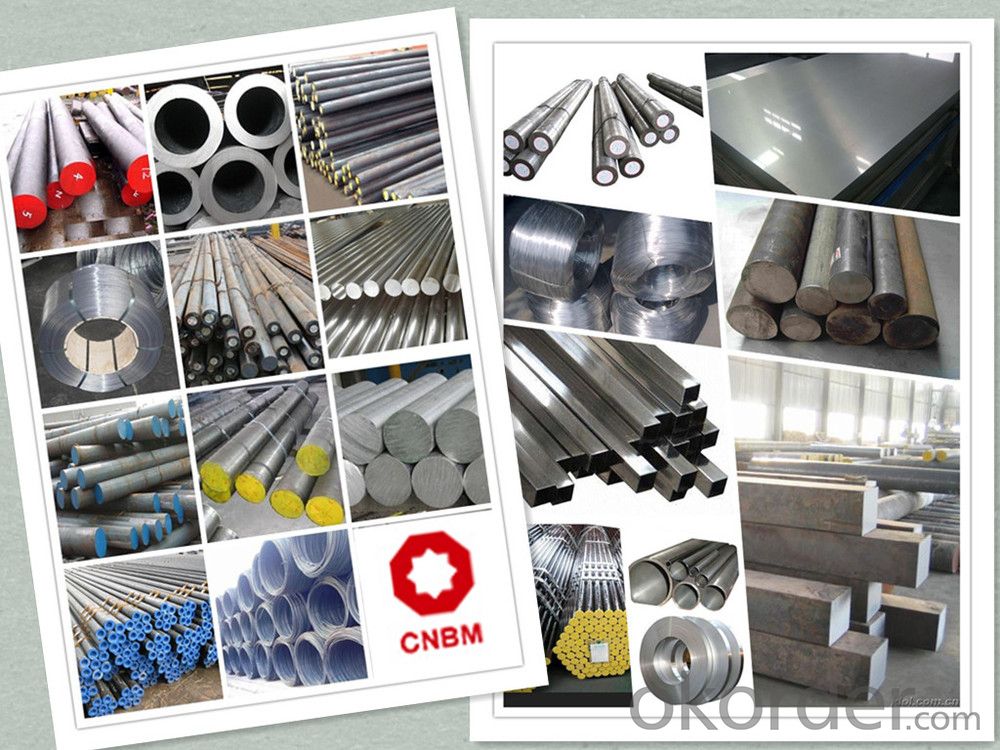
Product Overviews
| Product Name | Typical Grades | Diameter(mm) | Standard adopted |
| Carbon Steel | 20 (1020/S20C/C22) | Ø16-Ø300 |
GB/SAE/JIS/DIN
|
| 40 (1040/S40C/C40) | |||
| 45 (1045/S45C/C45) | |||
| Bearing Steel | GCr9 (51100/SUJ1) | Ø12-Ø250 | |
| GCr15 (52100/SUJ2/100Gr6) | |||
| GCr9SiMn (A485-Gr.1/SUJ3) | |||
Cr-Mo Steel | 20Cr (5120/SCr420H/20Cr4) | Ø12-Ø250 | |
| 40Cr (5140/SCr440/41Cr4) | |||
| 42CrMo(4140/SCM440/42CrMo4) | |||
| Gear Steel | 20CrNiMo | Ø16-Ø600 | |
| 20CrMn(5115/SMnC420/20MnCr5) | |||
| 20CrNiMo(8620/SNCM220/20CrMiMo2) |
Application
| Carbon Steel | Mold bottom, Plastic mold, Construction machinery parts Automobile parts, Security grills, Screens, Construction |
| Bearing Steel | Aerospace, Navigation, Nuclear energy, Chemical industry Electronic information, Petrochemical, Instrument and meter Transportation |
| Cr-Mo Steel | Mechanism & Fasteners gear, Stressed components for vehicles Engines and machines, Parts of larger cross-section |
| Gear Steel | All kinds of gears, Statically and dynamically stressed component for vehicles Engines and machine, Larger cross-section parts, Crankshafts |
Work Shop
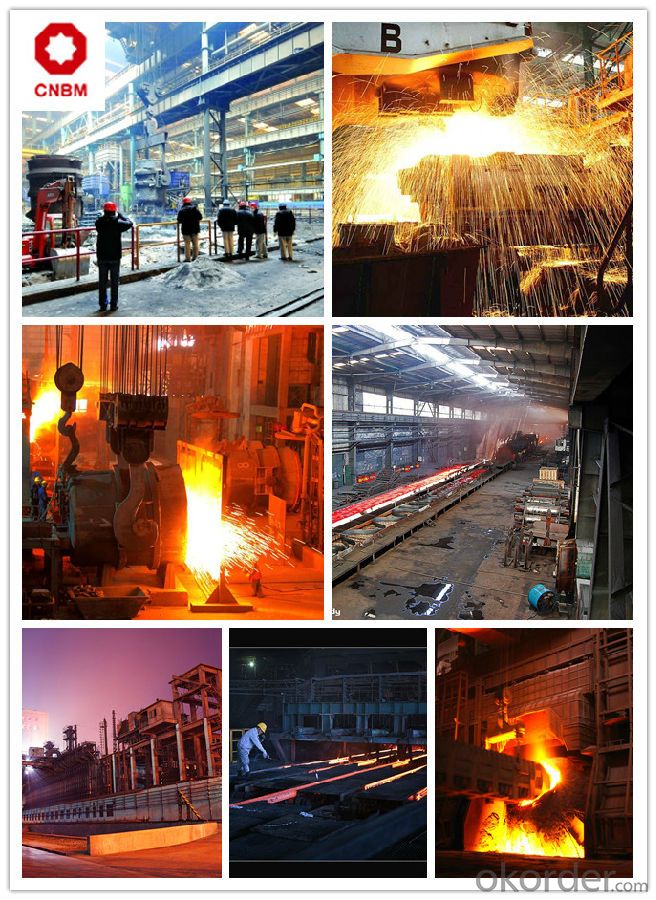
Company Information
CNBM International Corporation is the most important trading platform of CNBM group.
Whith its advantages, CNBM International are mainly concentrate on Cement, Glass, Iron and Steel, Ceramics industries and devotes herself for supplying high qulity series of refractories as well as technical consultancies and logistics solutions.

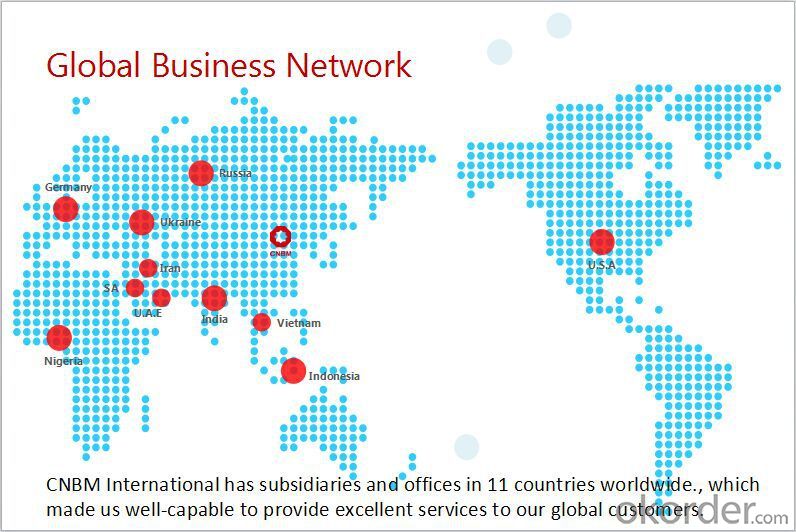
FAQ
1, Your advantages?
professional products inquiry, products knowledge train (for agents), smooth goods delivery, excellent customer solution proposale
2, Test & Certificate?
SGS test is available, customer inspection before shipping is welcome, third party inspection is no problem
3, Factory or Trading Company?
CNBM is a trading company but we have so many protocol factories and CNBM works as a trading department of these factories. Also CNBM is the holding company of many factories.
4, Payment Terms?
30% TT as deposit and 70% before delivery.
Irrevocable L/C at sight.
5, Trading Terms?
EXW, FOB, CIF, FFR, CNF
6, After-sale Service?
CNBM provides the services and support you need for every step of our cooperation. We're the business partner you can trust.
For any problem, please kindly contact us at any your convenient time.
We'll reply you in our first priority within 24 hours.
Packaging & Delivery
1, Packaging: seaworthy package or as required
2, Delivery: 35-45 days or based on quantity
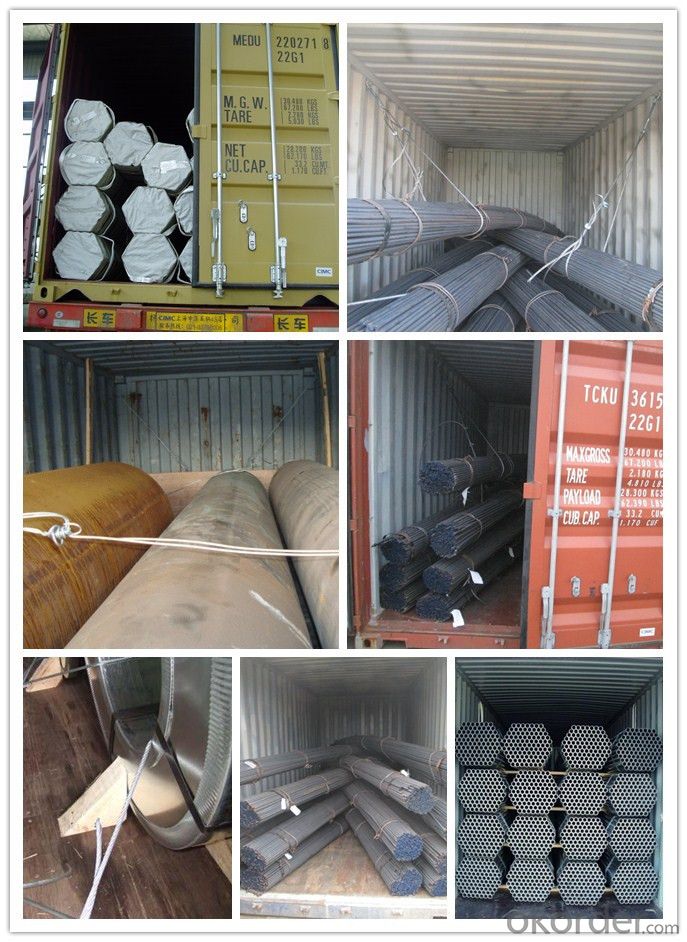
- Q: Are steel round bars suitable for the production of fasteners?
- Yes, steel round bars are suitable for the production of fasteners. Steel is a strong and durable material, making it ideal for fasteners that require high strength and stability. The cylindrical shape of round bars allows for easy machining and shaping into various types of fasteners such as bolts, screws, and studs. Additionally, steel round bars can be heat-treated to enhance their mechanical properties, making them even more suitable for use in fasteners.
- Q: Can steel round bars be used in the power generation industry?
- Yes, steel round bars can be used in the power generation industry. Steel round bars possess high strength and durability, making them suitable for various applications within the industry, such as supporting heavy machinery, constructing power plant structures, and manufacturing turbine components. Additionally, steel's resistance to corrosion and ability to withstand extreme temperatures make it an ideal material choice for the power generation industry.
- Q: What is the elasticity of a steel round bar?
- The elasticity of a steel round bar refers to its ability to return to its original shape after being subjected to external forces or deformation. Steel is known for its high elasticity, meaning it can withstand significant stress and strain without permanent deformation. This property makes steel round bars suitable for various applications, including construction, manufacturing, and engineering.
- Q: What's the difference between bar and round bar?
- If it is used for machining parts, it can be used in general. However, there are six bar material, and in general circumstances are not fixed feet, and round steel is generally sold according to the length of fixed length
- Q: What is the difference between carbon steel and alloy steel round bars?
- Carbon steel and alloy steel round bars are both widely used in various industries, but they differ in their composition and properties. Carbon steel round bars are primarily made up of iron and carbon, with trace amounts of other elements. The carbon content typically ranges from 0.05% to 2.0%, depending on the grade. These bars are known for their strength and hardness, making them suitable for applications that require high durability and wear resistance. Carbon steel round bars also have good machinability, meaning they can be easily shaped and formed into desired configurations. However, they may have limited corrosion resistance and may require additional protective coatings in corrosive environments. On the other hand, alloy steel round bars are made by adding various alloying elements to carbon steel. These alloying elements can include elements such as manganese, chromium, nickel, and molybdenum, among others. The addition of these elements enhances the properties of the steel, such as increased strength, toughness, and resistance to wear and corrosion. Alloy steel round bars are often chosen for applications that require specific properties, such as high temperature resistance, high strength-to-weight ratio, or improved machinability. In summary, the main difference between carbon steel and alloy steel round bars lies in their composition and resulting properties. Carbon steel round bars are primarily made up of iron and carbon, offering good strength and hardness, but may have limited corrosion resistance. Alloy steel round bars, on the other hand, have added alloying elements that enhance specific properties, such as increased strength, toughness, and corrosion resistance. The choice between carbon steel and alloy steel round bars will depend on the specific requirements of the application.
- Q: What are the different surface finishes available for steel round bars?
- There are several surface finishes available for steel round bars, each offering unique properties and applications. Some of the common surface finishes include: 1. Hot Rolled: This is the most basic surface finish, achieved by heating the steel above its recrystallization temperature and then allowing it to cool. It provides a rough and scaled surface, ideal for applications that do not require a high level of aesthetics. 2. Cold Drawn: In this process, the steel round bar is pulled through a die at room temperature, resulting in a smooth and polished surface. Cold drawn surface finish offers improved dimensional accuracy and tighter tolerances, making it suitable for applications that require precision and a visually appealing appearance. 3. Turned and Polished: Steel round bars can be turned on a lathe machine to achieve a smooth and shiny surface finish. This process removes any imperfections and irregularities, providing a close tolerance and highly finished surface. Turned and polished bars are often used in applications where a high level of surface finish and dimensional accuracy is required, such as in the manufacturing of shafts and precision components. 4. Ground: Steel round bars can be ground to remove any surface defects or irregularities. Grinding produces a highly accurate and smooth surface finish, making it suitable for applications that require close tolerances and a superior surface finish. Ground bars are commonly used in the manufacturing of bearings, gears, and other high-precision components. 5. Coated: Steel round bars can also be coated with various materials to enhance their performance and protect them from corrosion. Common coating options include zinc, chrome, and nickel. Coated bars offer improved durability, resistance to corrosion, and enhanced aesthetic appeal. The choice of surface finish for steel round bars depends on the specific requirements of the application, such as dimensional accuracy, surface quality, corrosion resistance, and aesthetic appeal.
- Q: Do steel round bars have a maximum load capacity?
- Yes, steel round bars have a maximum load capacity. The load capacity depends on various factors such as the diameter, length, and grade of the steel used. Engineering calculations and standards determine the maximum load capacity for specific applications and ensure the safety of the structure or component being supported by the steel round bars.
- Q: How do you calculate the moment of inertia of a steel round bar?
- In order to determine the moment of inertia for a steel round bar, one must possess knowledge of the bar's dimensions and properties. The moment of inertia serves as a gauge for an object's resistance to rotational changes. The formula utilized to compute the moment of inertia for a solid cylindrical item, such as a round bar, is as follows: I = (π/4) * D^4, where I signifies the moment of inertia and D symbolizes the bar's diameter. Initially, ascertain the diameter of the steel round bar by means of a caliper or ruler. It is essential to measure the diameter at its broadest point, typically found at the center. Subsequently, input the measured diameter into the formula and calculate the moment of inertia. It is crucial to use the correct units for diameter, such as inches or millimeters, to maintain consistency with the formula. For instance, let's assume the diameter of the steel round bar measures 2 inches. By substituting this value into the formula: I = (π/4) * (2 inches)^4 = (π/4) * 16 inches^4 = 4π inches^4. Therefore, the moment of inertia for the steel round bar with a diameter of 2 inches equals 4π inches^4. It is imperative to recognize that this formula assumes a solid cylindrical shape devoid of any alterations in diameter or hollow sections. If the round bar presents variations in diameter or is hollow, the moment of inertia calculation becomes more intricate and necessitates additional considerations.
- Q: What is the maximum aluminum content allowed for steel round bars?
- The maximum aluminum content allowed for steel round bars typically varies depending on the specific industry standards and specifications. However, a common maximum aluminum content limit for steel round bars is around 0.20-0.35%.
- Q: How are steel round bars tested for quality and compliance?
- To ensure quality and compliance, steel round bars undergo a series of rigorous tests and inspections. The most commonly used test is the tensile test, which measures the bar's ability to withstand pulling forces. By stretching the bar until it breaks and analyzing the stress-strain curve, its mechanical properties, including yield strength, ultimate tensile strength, and elongation, can be determined. Another important test is the hardness test, which assesses the bar's surface resistance to indentation. This test helps determine the material's strength and its ability to resist wear and deformation. Chemical analysis is conducted to verify the composition of the steel round bars. This test determines the percentage of elements present, such as carbon, manganese, silicon, sulfur, and phosphorus. It ensures that the steel meets the required specifications and is suitable for its intended application. Dimensional inspection is crucial to ensure that the steel round bars meet the specified dimensions and tolerances. This involves using calibrated instruments to measure the length, diameter, and straightness of the bars. The surface quality is assessed through visual inspection and non-destructive testing methods, such as ultrasonic testing and magnetic particle inspection. These tests detect any surface defects, cracks, or discontinuities that may affect the bar's performance and integrity. Additionally, specialized tests may be conducted based on the intended application of the steel round bars. For example, bars used in the construction industry may undergo corrosion resistance or impact testing. In summary, the quality and compliance of steel round bars are assured through a comprehensive range of tests, inspections, and analyses. These tests enable manufacturers and customers to determine the suitability and reliability of the bars for specific applications, ensuring the safety and effectiveness of the final products.
Send your message to us
SAE 52100 Bearing Steel Round Bars SUJ2
- Loading Port:
- China main port
- Payment Terms:
- TT OR LC
- Min Order Qty:
- 30 m.t.
- Supply Capability:
- 10000 m.t./month
OKorder Service Pledge
OKorder Financial Service
Similar products
Hot products
Hot Searches
Related keywords
